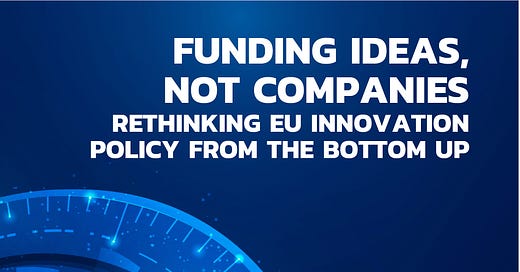Funding Ideas, Not Companies
Rethinking EU Innovation Policy from the Bottom Up: a new IEP@BU-Econpol-Ifo report
“Funding should be redirected to independent small and medium-sized applicants, and the focus should be on the growth potential of ideas rather than on company key figures.”
Daniel Gros
Download the Report
The billion-euro EU programme Horizon programs need to be completely realigned if they are to strengthen Europe's innovative power. This is the conclusion of a study by the Institute for European Policymaking at Bocconi University and EconPol Europe.
According to ifo President Clemens Fuest, the approximately EUR 100 billion of the Horizon funding over the last decade has reached the wrong beneficiaries. “Our findings show that the majority of the funds went to large companies and consortia that have achieved limited innovation and growth results,” he says.
Co-author Daniel Gros, Director of the Institute for European Policy Making (IEP@BU) at Bocconi University, suggests a fundamental change in EU innovation funding: “Funding should be redirected to independent small and medium-sized applicants and the focus should be on the growth potential of ideas rather than on company key figures.”
A large part of Horizon funding goes to big companies and their spin-offs that have many, sometimes even hundreds of Horizon projects, but are not particularly dynamic. Projects involving many participants create only a flash in the pan lasting a few years, without any positive long-term impact.
This type of program involving many participants also suffers from excessively detailed research questions determined by unwieldy Programme Committees in which Member states push their interests and those of their national champions. This process leads to incremental improvements rather than major leaps in innovation.
The authors conclude: “Horizon grants have become a regular source of financing for many established companies, rather than an opportunity to fund innovative ideas.” The report also finds that programs for single recipients and more bottom-up have positive long-term effects. Such programs currently account for less than 8 percent of funding.
Under the title Funding Ideas, Not Companies: Rethinking EU Innovation Policy from the Bottom Up, the study proposes a fundamental departure from the current funding policy that does not necessarily require a larger budget: More ‘open calls’ to independent SME, in which different approaches to innovation projects can be presented on an equal footing.
The report analyses the policy changes required for the European Union to avoid the “middle technology trap” identified in the widely cited 2024 report produced by IEP@BU and EconPol Europe, in collaboration with the Toulouse School of Economics.
Key Findings
Funding allocation skewed toward low-growth firms
More than half of Horizon program funding goes to mid-tech firms and consultancies with limited innovation and growth potential.
Dominance of large corporate groups
Many beneficiaries are repeat recipients—some involved in up to 200 projects—typically belonging to wide corporate groups. These entities receive funding for research that is close to their corporate interests.
Collaborative instruments: Limited impact
Most Horizon funding (60-80%) is directed to collaborative instruments involving sizable international consortia with detailed top-down research agendas. However, there is no evidence that these collaborations improve recipients’ long-term growth or innovation outcomes. Some positive effects are observed during the grant period (about three years), but they do not persist beyond the funding horizon.
Collaborative instruments: Research programs dominated by Member States
The work programs for these collaborative instruments are elaborated by big program committees in which national, often corporate interests dominate. This leads to programs that seek incremental, rather than radical innovation.
Early-stage innovation support seems ineffective
Grants targeting early-stage innovation often go to large corporate entities rather than small independent firms. For these large firms, it is difficult to measure the impact of relatively small grants.
Single-entity, SME-targeted instruments show the most promise
Funding programs like the SME Instrument and European Innovation Council (EIC) Accelerator show significant and lasting positive effects—but only for small, independent firms (i.e. SMEs that do not belong to wider groups). These companies are also more likely to file high-tech patents.
Limited reach of effective funding
Only 35% of funding reaches independent innovators in the sample; the figure drops to 12% for the overall Horizon program. Additionally, the strongest growth effects are observed in consultancy and support service sectors, not in IT or manufacturing.
Key Recommendations:
Refocus Horizon funding
Reallocate resources from collaborative instruments to SME-targeted programs—especially those supporting early-stage, high-potential innovation—within Pillar 3 of Horizon Europe (under the EIC).
Support independent innovators
Prioritize funding for small, independent companies that do not belong to corporate groups. Impose limits on repeated participation and restrict funding to consultancy firms.
Encourage novelty and bottom-up innovation
Promote open and flexible calls to allow space for novel and diverse ideas, following the EIC’s “Challenge” approach.
The IEP@BU Mission
Founded by Bocconi University and Institute Javotte Bocconi, the Institute for European Policymaking @ Bocconi University combines the analytic rigor of a research institute, the policy impact of a think tank, and the facts-based effort of raising public opinion’s awareness about Europe through outreach activities. The Institute, fully interdisciplinary, intends to address the multi-fold obstacles that usually stand between the design of appropriate policies and their adoption, with particular attention to consensus building and effective enforcement.
The Institute’s mission is to conduct, debate, and disseminate high-quality research on the major policy issues facing Europe, and the EU in particular, its Member States and its citizens, in a rapidly changing world.
It is independent of any business or political influence.
The IEP@BU Management Council
Catherine De Vries, IEP@BU President
Daniel Gros, IEP@BU Director
Sylvie Goulard, IEP@BU vice-President, Professor of Practice in Global Affairs at SDA Bocconi School of Management
Silvia Colombo, IEP@BU Deputy Director
Carlo Altomonte, Associate Professor at Bocconi University and Associate Dean for Stakeholder Engagement Programs at SDA Bocconi School of Management
Arnstein Assve, Professor in Demography at Bocconi University
Valentina Bosetti, professor of Environmental and Climate Change Economics at Bocconi University
Elena Carletti, Dean for Research and Professor of Finance at Bocconi University
Eleanor Spaventa, Professor of European Union Law at Bocconi Law School







